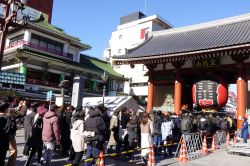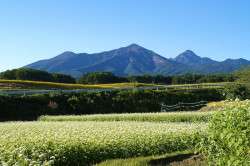
Originally published on metropolis.co.jp on May 2011
See ya!

Phil Couzens
- The justice ministry put the number of “flyjin”—foreigners who left Japan after the March 11 earthquake—at 531,000. Go on, everyone, take a bow!
- The government is rethinking the draconian power-saving measures it had planned for the summer after TEPCO said it could crank out 52 million kilowatts of electricity by the end of July, instead of the previously stated 46.5 million kw.
- Kevin Maher, who was canned as head of the US Office of Japanese Affairs because of comments he allegedly made in December, denied he ever called Okinawans “lazy.” He also claims he never said they are “masters of manipulation and extortion.”
- Not everyone was resting up during Golden Week. Foreign Minister Takeaki Matsumoto was scheduled to go on a six-day blitz of the US, Europe and Africa starting April 29.
- Surprising absolutely no one, the Japan National Tourism Organization announced that the number of foreigners who traveled to Japan in March was half the number compared to last year.
- The Public Security Intelligence Agency said that the Aum Shinrikyo doomsday cult still has about 1,500 active members.
- Nine Japanese universities have clubbed together to found a Japanese public high school in Shanghai—the first ever such school to open overseas.
- In what is being described as the largest per person donation from any country since the earthquake and tsunami, Taiwan has offered Japan ¥13.9 billion, which works out to ¥600 per capita.
If you can’t do the time…
- Disgraced actor Manabu Oshio had his 30-month prison sentence upheld by the Tokyo High Court. Oshio will serve time for negligence after giving ecstasy to a girlfriend who later died.
- For the first time in three years, the leaders of Japan, China and South Korea will get together and talk things over in person. The confab will take place May 21-22 in Tokyo.
- JTB estimates that the number of overnight trips made by the Japanese during Golden Week dropped 27.8 percent compared to last year.
- A group of researchers from the National Cancer Center Research Institute and the University of Tokyo became the first scientists in the world to succeed in sequencing a liver cancer cell genome.
- Bottom Story of the Week: “Tsumura Succeeds in Mass Cultivation of Licorice in China” (via Jiji)
- In an effort to save energy this summer, the Tokyo Stock Exchange is moving up its working day by one hour. The new schedule is 7:45am-3:45pm.
- Toshiba has released the world’s first self-encrypting hard disk drive. The device becomes “automatically invalid when [it is] removed from lost, stolen or discarded devices and connected to an unauthorized host system.”
Idle hands abound
- Sony announced that global sales of the PlayStation 3 have topped 50 million units since its launch in 2006.
- Meanwhile, sales of the PS2 have reached 150 million.
- Sanyo says it is ready to take orders again for its Gopan bread-making machine, which uses rice instead of wheat. The device was such a hit after being launched last November that the manufacturer had to figure out a way to boost output from 10,000 units per month.
- Seven copies of the Ishinomaki Hibi Shimbun, which was produced by hand when the paper lost its printing press in the March 11 quake, were being displayed at a journalism museum in Washington, DC.
Streaker alert!
- 43-year-old Hanshin Tigers veteran outfielder Tomoaki Kanemoto’s consecutive-game streak came to an end at 1,766 at Nagoya Dome. He came in as a pinch hitter with two out in the eighth inning against the Chunichi Dragons, but when a baserunner was thrown out trying to steal second, Kanemoto was unable to complete his at-bat and did not take the field defensively. “I don’t care at all [that the streak ended],” he said. “I’ve often told the manager not to use me for just the record’s sake.”
- TEPCO used a pair of US-made robots, called PackBots, to go where no man was willing to go—inside damaged reactors at the Fukushima nuclear power plant. The bots took radiation measurements, among other things.
- In other TEPCO news, the company has said that either the president or the chairman will resign in June to take responsibility for the nuclear disaster. They might both fall on the sword, but they are still trying to figure out who should stick around and be in charge during the ongoing fiasco. How Japanese of them.
- The National Police Agency reported that over 90 percent of the March 11 earthquake/tsunami victims in Iwate, Miyagi and Fukushima died from drowning.
- The NPA also said that more than 65 percent of those victims were 60 years old or older and that people in their 70s comprised the largest share of the victim total (24 percent).
Men of letters
- Donald Keene, 88, an American expert on Japanese literature and professor emeritus at Columbia University, quit his teaching career and plans to move to Tokyo to “fulfill his dream of writing full-time.”
- A poem by Iwate native Kenji Miyazawa called “Ame ni mo makezu” (“Strong in the rain”) has become popular across Japan and overseas in the wake of the March 11 disaster due to its inspirational message.
- It was proposed by a panel established to clean up sumo and rid the sport of bout-rigging that the use of cellphones be banned in locker rooms.
- Among the items slow to return to store shelves after the March 11 quake were yogurt and beer.
Compiled from reports by Japan Today, The Asahi Shimbun, Jiji, The Daily Yomiuri, The Japan Times, Mainichi Daily News, The Tokyo Reporter, AP, AFP, Reuters and Kyodo







